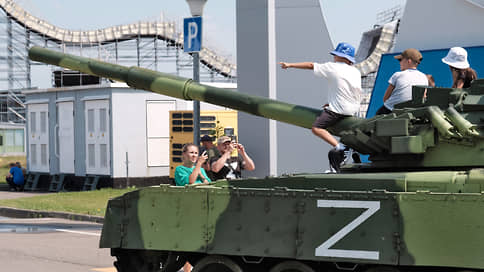You can’t put up with advancing – Newspaper Kommersant No. 143 (7344) of 08/09/2022
[ad_1]

More than half of Russians believe that the special military operation in Ukraine has dragged on, and according to a third, hostilities will last for more than a year, follows from a recent survey by the Russian Field sociological service. At the same time, 60% of respondents would support Vladimir Putin’s decision to launch a “new attack on Kyiv”, but at the same time 65% would also approve of the president’s intention to stop the special operation and sign a peace agreement. The expert believes that such a contradiction is connected with the unwillingness of society to think about big political problems.
The study was conducted by telephone survey on July 28-31, 1609 respondents in eight federal districts took part in it. The authors of the study warn that its results on a number of questions about what is happening in Ukraine may not coincide with the real situation, since “Russians are afraid to talk about this topic – refusals have increased, sincerity has decreased.”
The opinion that Russia’s special military operation in Ukraine has dragged on was supported by 59% of Russian Field survey participants: 33% say that the special operation “definitely” dragged on, another 26% said that it “rather” dragged on. The opposite opinion is shared by 28% of respondents, and 13% found it difficult or refused to answer this question. At the same time, 41% of respondents admitted that they feel “tired from the news about the course of the military operation in Ukraine”, but the majority (56%) do not experience such feelings.
According to 30% of respondents, the special operation in Ukraine will continue for more than a year, 18% believe that hostilities will end within a year. 20% of respondents hope for their completion within six months, and only 13% of those polled are optimistic about the end of hostilities within one to three months.
62% of Russians are sure that the special operation is “definitely” or “rather” successful, 19% hold the opposite opinion, and the same number found it difficult to answer. At the same time, almost two-thirds of the men surveyed (62%) are not ready to personally take part in hostilities in Ukraine if they have the opportunity – this is six percentage points higher than the same survey, which took place in the second half of May. 29% of respondents expressed their desire to participate in a special operation, and most often people aged 45 to 59 (37%) admit this, while among men aged 18 to 29, only 23%. There are also not so many people who want to help the Russian military financially: 67% are not ready to donate their own funds in support of the special operation, and 12% agree to spend no more than 1 thousand rubles on this. per month.
Vladimir Putin’s decision “to announce the start of a new attack on Kyiv tomorrow” would be supported by 60% of respondents, 26% would be against it. It is noteworthy that sociologists recorded almost the same alignment when answering the question about the president’s hypothetical decision “tomorrow” to stop the special operation and sign a peace agreement: 65% would approve it, and 28% would be against it. In general, 52% of the respondents were in favor of continuing the military operation, and 38% were in favor of moving to peace negotiations. The authors of the study note that over the period from mid-March to the end of July, the ratio of supporters and opponents of the special operation remained practically unchanged: now 69% of respondents support it, 23% hold the opposite opinion, and another 8% found it difficult or refused to answer.
According to political scientist Alexei Makarkin, the fact that the majority of Russians are ready to approve two opposite decisions of Vladimir Putin – to stop the special operation and start a new offensive – can be considered an expression of confidence in the president. In addition, there is an attitude that is rooted in society that “the authorities know better, we are small people,” and the “little man” is not very versed in current politics and does not want to do this, the expert continues. He recalls that when in the late 1980s and early 1990s, in addition to personal and domestic concerns, people also faced the problem of responsibility for their choice, this caused psychological discomfort for a significant part of the population. “Then there was such a request: let the authorities tell on TV how to behave correctly. But the government did not speak. Then this part of society was pleased that Putin appeared and took responsibility,” Mr. Makarkin notes. Therefore, now the people simply trust the president, who “allowed them not to think about current politics,” the political scientist sums up.
[ad_2]
Source link








